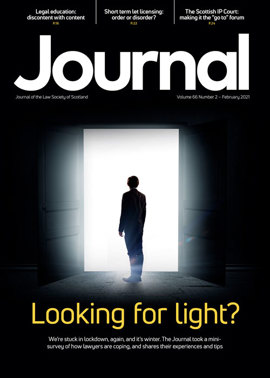The courts are getting there virtually...
Working from home has become the norm for so many of us over the last 10 months. There have been challenges along the way, requiring both employers and employees to adapt. From March to June 2020, the Scottish court system effectively shut for all but urgent business. This left civil lawyers and their clients in limbo. With no set timeframe as to when the country might return to some sense of normality, solicitors and advocates were united in a call to arms.
The call was answered in July when guidance was finally issued to allow civil court business to recommence. Arrangements were made for court documents to be lodged electronically. Both preliminary and final hearings were restarted using videoconferencing. This massive leap forward for courts operating during the global pandemic was welcomed by most within the profession.
In October, we conducted our first “virtual proof” for an injured cyclist who had come off his bicycle on a segregated cycle path in St Andrews. The guidance set out by the Personal Injury Court was easy to follow. A joint bundle of productions was agreed between parties in advance and copies distributed electronically to the court and witnesses. Preliminary business was dealt with on the Monday before we proceeded to proof on the Tuesday, meaning no wasted time. Proof proceeded as scheduled at 10am on the Tuesday, which was almost unheard of pre-March 2020. Rather than asking witnesses to hang around, I simply texted them when it was their time to connect and enter the virtual court.
Saving experts' time
I've been a civil court litigator for 10 years, and it's astonishing the number of hours I have spent waiting for a court hearing to start; waiting for a sheriff to be allocated; chasing down witnesses that weren't where I had left them; placating irate expert witnesses when you had to tell them the case is running late due to the sheriff having preliminary business; or even worse, having to tell your expert witness, patiently waiting, to come back again tomorrow! On so many occasions, I wanted to scream that it wasn't my fault – it's just the way the court system works. It rarely runs like clockwork. With virtual hearings in place, those wasted days could finally be a thing of the past.
In every personal injury case, there's at least one medical expert instructed. In complex injury cases, it's not unusual to have five or six medical experts. Medical experts were frequently summoned to the court to wait around, only to be called back the following day as the going in court was slow.
These medical expert witnesses are, more often than not, treating clinicians in the NHS. With virtual hearings now in place, we finally have the ability to limit busy consultants' time away from patients or theatre lists. With the introduction of virtual hearings, solicitors now must indicate how long each witness will take to give evidence, and provide the necessary contact information so that witnesses can attend proof virtually. This avoids unnecessary travel, which is great for carbon footprint. A consultant can now spend the morning seeing patients and attend “court” to provide evidence in a personal injury action in the afternoon.
No going back
Hand in hand with the move to virtual hearings is the electronic lodging of court documents. While this had been standard practice for some firms prior to March 2020, there was still a requirement, come proof, to make paper copies of all productions available to the court. Many solicitors will tell you that this often led to page numbers or even whole productions going awry. The recent changes mean that both parties must agree a joint bundle seven days in advance of proof. This is submitted electronically and made available to the witnesses. Gone are the days where your page 3 does not match the defender's or, heaven forbid, the sheriff's!
Whilst many within the profession were critical of the court in the early months of the lockdown, the steps that have since been taken have brought the court system forward years rather than months. This could not have been an easy move, but we very much welcome these changes. One thing is for sure, there can be no going back.
Regulars
Perspectives
Features
Briefings
- Criminal court: Discount season
- Family: Capital values in uncertain times
- Employment: Can employers require staff vaccination?
- Human rights: Protecting the child claimant
- Pensions: a bill with teeth
- Charities: commerce as public benefit?
- Property: Playing safe: on the right track?
- In-house: Wide world of in-house
In practice
- Priorities for our Parliament
- The Word of Gold: The gift that keeps on giving
- TRS: more trusts, more information, more access
- A proper conclusion
- The Eternal Optimist: Putting resolve into resolutions
- Appreciation: Professor Emeritus Robert Rennie
- Ask Ash: Trainee in a rut
- Royal Faculty invites new members






